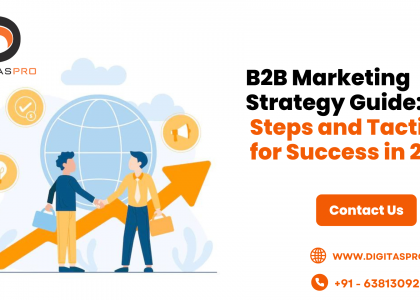


Marketing is the lifeblood of any business, serving as the bridge between a company and its customers. In today’s digital age, where information travels at the speed of light and competition is fierce, effective marketing has become more crucial than ever. This blog post explores why marketing is so important for businesses, delving deep into its multifaceted significance. We’ll also spotlight DigitasPro Technologies, a leading player in the marketing technology landscape, to illustrate real-world applications and benefits. This comprehensive analysis aims to provide a thorough understanding of the pivotal role marketing plays in the business world.

The foundation of any successful business lies in its ability to acquire customers. Marketing is the primary vehicle for reaching potential customers and converting them into loyal patrons. We’ll explore:
How marketing helps businesses identify and understand their target audience, ensuring that their efforts are focused on the right people.
A detailed look at the stages of the customer conversion funnel and how marketing strategies are deployed at each stage.
Examples of how DigitasPro Technologies leverages data-driven marketing to enhance customer acquisition for its clients.

A strong brand presence is synonymous with business success. Marketing plays a pivotal role in creating and maintaining brand awareness. This chapter will cover:
The various branding strategies and techniques that marketing employs to establish a brand’s identity and reputation.
The importance of consistent brand messaging across all marketing channels and how it fosters trust among consumers.
Case studies showcasing how DigitasPro Technologies has helped clients elevate their brand awareness through innovative marketing campaigns.

While acquiring new customers is essential, retaining existing ones is equally vital for long-term success. Marketing plays a significant role in customer retention through:
How marketing-driven loyalty programs can incentivize repeat business and foster customer loyalty.
The power of personalized marketing in keeping customers engaged and satisfied.
Insights into how DigitasPro Technologies utilizes data analytics to create personalized marketing strategies that boost customer retention.
In a crowded marketplace, standing out is crucial. Effective marketing can provide businesses with a competitive edge by highlighting their unique selling points and advantages. This chapter will explore:
How marketing helps businesses differentiate themselves from competitors.
The role of marketing in positioning a business as a leader or innovator within its industry.
Real-world examples of how DigitasPro Technologies has helped clients gain a competitive advantage through strategic marketing initiatives.

Ultimately, every business aims to generate revenue, and marketing is a primary driver of sales and profits. In this chapter, we’ll delve into:
The importance of measuring the ROI of marketing efforts and how it impacts the bottom line.
How marketing fine-tunes the sales process to maximize revenue generation.
Success stories showcasing how DigitasPro Technologies has helped clients achieve impressive revenue growth through innovative marketing campaigns.
Marketing is not just about promoting products or services; it’s also a valuable tool for gathering market insights and consumer behavior data. This chapter will discuss:
How marketing research helps businesses stay abreast of evolving consumer preferences and trends.
The role of marketing data in informing strategic business decisions.
Examples of how DigitasPro Technologies leverages data analytics to provide clients with actionable market research insights.
Customer feedback gathered through marketing efforts can be a goldmine for product development and enhancement. This chapter will explore:
How marketing channels facilitate the collection of valuable customer feedback.
How businesses can use customer feedback to refine their products and services.
Case studies illustrating how DigitasPro Technologies has helped clients enhance their offerings based on customer feedback gathered through marketing initiatives.
Effective communication with customers is key to building trust and fostering long-term relationships. In this chapter, we’ll discuss:
The various channels through which marketing facilitates communication with customers.
How transparent and consistent communication builds trust and brand loyalty.
Real-world examples of how DigitasPro Technologies has helped clients enhance customer communication and engagement through cutting-edge marketing technologies.
Markets are dynamic, and consumer preferences can change rapidly. Marketing helps businesses adapt to these changes by adjusting strategies, products, or services to remain competitive. This chapter will cover:
How marketing enables businesses to respond quickly to market shifts and trends.
The role of marketing in allowing businesses to pivot and adapt when necessary.
Insights into how DigitasPro Technologies assists clients in staying agile and responsive to market changes through data-driven marketing strategies.
The effectiveness of marketing efforts can be quantified and analyzed, enabling data-driven decision-making and resource allocation. In this final chapter, we’ll discuss:
The essential metrics used to measure the success of marketing campaigns.
How data analysis informs strategic adjustments and optimizations.
A look at the tools and technologies used by DigitasPro Technologies to measure and analyze marketing success, providing clients with actionable insights.
Marketing is undeniably the cornerstone of business success. From customer acquisition and brand awareness to revenue generation and adaptive strategies, marketing touches every facet of a business’s operations. As illustrated by DigitasPro Technologies, a trailblazer in the marketing technology landscape, leveraging innovative marketing strategies and technologies can propel a business to new heights. In today’s rapidly evolving business landscape, recognizing and harnessing the power of marketing is not just important; it’s essential for sustained growth and success.
Marketing in business refers to the set of activities and strategies used to promote, advertise, and communicate the value of a product or service to potential customers. It encompasses various techniques aimed at attracting, retaining, and engaging customers.
Marketing is vital for businesses because it helps them acquire customers, build brand awareness, retain existing customers, gain a competitive advantage, generate revenue, gather market insights, improve products or services, communicate effectively, adapt to market changes, and measure success.
Marketing identifies and targets potential customers, raises awareness about a business’s offerings, and persuades individuals to become customers through various strategies such as advertising, content marketing, and lead generation.
Marketing creates and maintains brand awareness by consistently promoting a brand’s identity, values, and messaging across various channels. It helps consumers recognize and trust a brand.
Marketing contributes to customer retention through loyalty programs, personalized communication, and engaging content that keeps existing customers satisfied and loyal to a brand.
Marketing helps businesses differentiate themselves from competitors by highlighting their unique selling points, positioning them as industry leaders, and crafting compelling marketing messages that resonate with target audiences.
Marketing drives revenue by attracting potential customers, guiding them through the sales funnel, and optimizing the sales process. It ultimately results in increased sales and profits.
Marketing conducts market research to understand consumer behavior, preferences, and trends. Data collected through marketing efforts provides valuable insights that inform business decisions.
Marketing gathers customer feedback and insights that businesses can use to refine and enhance their products or services. It helps in creating offerings that better meet customer needs.
Marketing employs various communication channels to engage with customers, share information about products or services, and build trust. It fosters long-term customer relationships.
Marketing allows businesses to stay agile by monitoring market trends, consumer behavior, and competitive landscape. It enables businesses to adjust strategies and offerings to stay relevant.
Businesses measure marketing success through key performance indicators (KPIs) such as conversion rates, ROI, website traffic, and customer satisfaction. Data-driven insights help in assessing the effectiveness of marketing campaigns.


